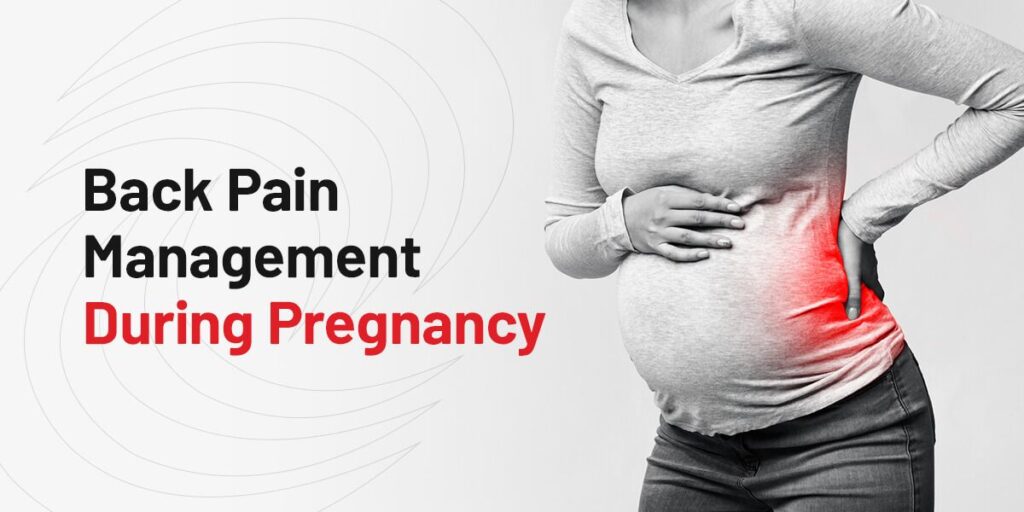
During pregnancy, most women experience back pain in their sacroiliac joints, which connect the pelvis and lower spine. Several factors can cause pain in this region, such as:
When it comes to managing back pain during pregnancy, you have many different options. The best techniques for you depend on the type of back pain you’re experiencing and how far along you are in your pregnancy. Here are some suggestions to help you find relief:
1. Check Your Posture
You may feel like you’re going to fall forward as your baby grows, and to prevent this, you might lean back when you stand. As mentioned above, leaning backward puts extra stress on lower back muscles, which can cause pain. To keep your back from getting sore, try practicing good posture when you stand and sit. Here are a few tips:
Make sure to pay attention to your posture when you sit as well. Choose a comfortable, supportive chair or place a pillow or lumbar roll behind your back.
2. Wear Low-Heeled Shoes
Avoid wearing flats or high heels during pregnancy, and instead, choose low-heeled shoes with adequate arch support. If you wish to wear flat shoes, ensure they have supportive insoles.
3. Wear a Maternity Belt
A maternity belt is a garment that holds up your belly. It helps remove some of the weight from your back and hips and can make you feel more comfortable. A maternity belt can also serve as a cue to help you maintain good posture.
4. Be a Side Sleeper
Later in your pregnancy, avoid sleeping on your back and sleep on your left side instead. Doctors recommend sleeping on your left side to improve circulation and prevent your body weight from pressing on your liver. Consider placing a body pillow under your stomach, between your knees and behind your back. This position can help take some stress off your back.
5. Exercise Every Day
Exercise can keep muscles strong, support good posture and decrease pain. While you’re pregnant, consider doing mild activities like going for a short stroll or swimming. Swimming, in particular, is an excellent exercise for pregnant women because it relieves pressure from the spine. It’s also a relaxing way to strengthen your body’s core muscles.
You might also try prenatal yoga to relieve pain, improve posture and flexibility, and strengthen muscles. Prenatal yoga can also lower stress levels and help you get more restful sleep, which can both help relieve and prevent back pain.
Lastly, aim to add stretching to your routine. A doctor or physical therapist can recommend stretches and exercises that are safe for you.
6. Practice Proper Lifting
Be mindful when lifting groceries or boxes of baby clothes. Make sure to bend your knees, keep your back straight as you pick up objects and push up with your legs rather than your back. Avoid lifting anything too heavy or above 20 pounds. As a general rule, it’s best to have someone else lift things for you.
7. Apply Heat and Ice
You might try soothing back pain by applying an ice pack and heating pad to the affected area. For example, you can apply an ice pack wrapped in a towel to the painful area for up to 20 minutes several times a day. After a couple of days, switch to a heating pad. Just be sure not to apply heat to your abdomen. It’s best to ask your doctor what methods they recommend.
8. Get a Massage
A massage can instantly relieve back pain and help stress and anxiety melt away. To ensure you get a massage that is best for you and your growing baby, look for a certified prenatal massage therapist.
9. Ask Your Doctor About Acetaminophen
Consider asking your doctor if it’s safe to take acetaminophen for back pain relief. Doctors recommend that pregnant women do not take ibuprofen, aspirin or naproxen.
10. Meditate
Meditation relieves stress and muscle tension, which can help with back pain. There are many different ways to meditate and enjoy its relaxing benefits. You might try guided meditation, for example, or perform a simple breathing exercise. Regardless of the method you choose, meditation can help you achieve a peaceful state of mind.
If you’re still wondering how to relieve lower back pain during pregnancy or have not been able to find relief, know that professionals are ready to help. At Desert Institute for Spine Care (DISC), we’ll be happy to answer your questions and recommend safe and effective treatments for pregnancy-related back pain. Contact us today to learn more or schedule an appointment at one of our Phoenix-area locations.
Visit Here to Schedule An Appointment